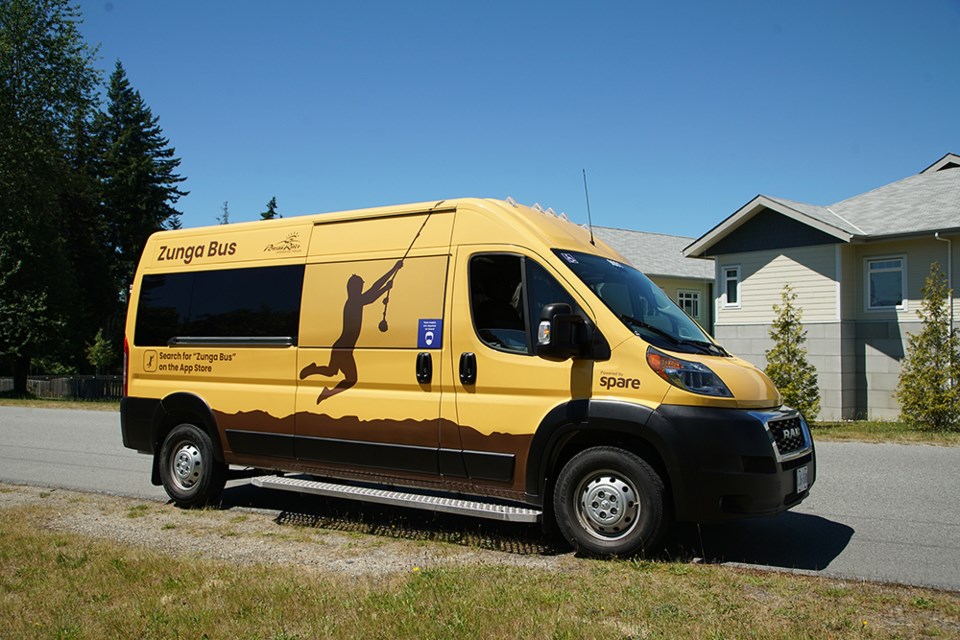qathet Regional District’s board of directors will consider a study into operating an on-demand bus service in rural areas of the region.
At the July 14 committee of the whole meeting, Electoral Area B director Mark Gisborne said he read through the staff report, and noted $65,000 for the study, with $50,000 coming from a rural transit solutions fund grant, and $15,000 from the paratransit contingency to cover any leveraged funding deficiency.
Gisborne said in the report, for the project, it stated that through the desktop study, the consultant will be expected to determine the number of shuttle vans or small buses and any other capital purchases required, as well as ongoing operating and maintenance costs, for an expanding busing service.
“So, $65,000 is being put aside to do a desktop study to determine how much more we are going to need to spend to provide, what I am reading as on-demand public transit,” said Gisborne. “I have some issues with that model.
“I’ve typically viewed public and mass transit as a more urban amenity. Moving lots of people in a cost-effective way requires density for the service area. The large amount of ridership ensured it was generally profitable.”
Gisborne said he believes in transit-oriented development, but he said the problem with on-demand is that it doesn’t move in the direction of transit-oriented development, and that it is heavily subsidized by taxpayers.
“I don’t support spending this kind of money to study something that I don’t see working in a rural area without significant cost to taxpayers,” said Gisborne.
Electoral Area D director and committee chair Sandy McCormick said the point is to give rural residents an alternative to using private vehicles.
“Right now, there is no alternative,” said McCormick. “When you live in an area that isn’t served by transit, and it’s too far to ride a bike, or you don’t own a bike, you’re stuck with a car. We need to give people alternatives and this has worked well in other areas. It would behoove us to look at it here so we can give people an alternative.”
City director CaroleAnn Leishman said she supported the initiative to look at designing an on-demand rural transit system.
“This is where we have to go if we are going to meet our climate change targets,” said Leishman. “We have to make it accessible, efficient and affordable for our residents, no matter where they live, to get around. We have to get people out of their cars.
“This is going to allow our rural residents to get into town to access health care, for shopping, or whatever they need, and the on-demand model has proven that there are not empty buses driving around. The funding required is for consultants to design what makes the most sense for our area.”
Hybrid component
Electoral Area A director Patrick Brabazon said the proposal is for a hybrid component for a vehicle that operates on the highway that would hive off onto the side roads.
“When I first ran for election two decades ago, I asked people what they really wanted,” said Brabazon. “Often, I would get young people who wanted to be able to come into Powell River where the jobs were, work for a living, and get home in the same day. We still haven’t reached that standard, five days a week.
“While I’m reluctant to support a glorified taxi service, the report proposes a vehicle that will go up and down the highway, and will wander off onto a side road to pick up somebody, so you’ll have to schedule it. It will meet public demand and get people out of their cars. I’m fully in favour of it.”
Gisborne said he agrees that climate change needs to be tackled. He said, however, with the argument of getting people out of cars and into the regional district’s vehicle, he doesn’t see how that is efficient and cost-effective in terms of making a sizable impact on climate change.
McCormick said the motion before the committee was about getting a study done. She said there were no decisions being made about what might be done after the results of the study are completed.
The committee recommended that the board authorize the signing of the rural transit solutions fund grant agreement for $50,000, and that the board allocate a maximum of $15,000 from the paratransit service contingency to cover any leveraged funding deficiencies.



